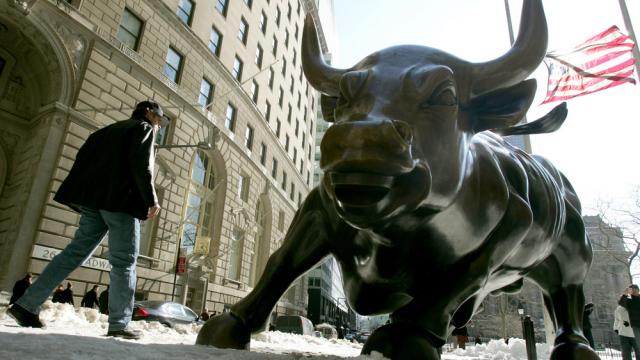
A broad new government rule to limit risk-taking by Wall Street will force banks to rethink virtually every aspect of their trading activities, setting the stage for more tumult at the largest U.S. financial institutions.
The so-called Volcker rule, approved by five financial regulatory agencies on Tuesday, could lop as much as $10 billion total in yearly pretax profit from the eight largest U.S. banks through lower revenue and higher compliance costs, according to estimates from Standard & Poor's.
The 953-page edict, part of the 2010 Dodd-Frank financial overhaul, codifies and restricts the way banks trade securities. It curbs banks' ability to bet with their own capital and forces them to draw bright lines separating trades for clients from trades to limit their risks and so-called proprietary bets.
Named for Paul Volcker, the former Federal Reserve chairman, the rule extends the government's reach into Wall Street's most profitable core. Proprietary trading helped fuel the financial-services industry's climb to dizzying heights in the years leading up to the financial crisis—and created millionaires within the biggest banks.
The rule "will help the stability of the broader economy" by restoring trust and confidence in banks, Mr. Volcker told The Wall Street Journal Tuesday.
Goldman Sachs Group Inc. has the most at stake with the new rule, said analysts, who noted that Goldman generates a higher percentage of revenue from trading and investments than rivals such as Morgan Stanley.
Executives at the large banks spent Tuesday poring over each passage of the final rule, hunting for details that will help them formulate their responses to the provision. Few bankers spoke openly about the rule, which goes into effect on April 1, or its possible impact. Privately, though, many noted that much still depended on how the regulators interpreted—and enforced—it.
Critics have argued that proprietary trading didn't cause the crisis, and that limiting banks' ability to take risks to fulfill clients' needs could make markets volatile. But the 2012 revelation of a multibillion-dollar trading loss at JPMorgan Chase, orchestrated by an employee dubbed the "London whale," swung momentum on the side of regulators.
The Volcker rule's approval comes at an uneasy time on Wall Street. The biggest banks already have been buffeted this year by a slowdown in trading by investors, while a jump in interest rates has slowed their mortgage machines. Banking jobs and compensation are down sharply from precrisis levels. The limits imposed by the rule are expected to weigh on the industry even more.
Wall Street firms trade in a number of ways. They make markets to help clients buy and sell stocks, bonds and other securities. The firms earn a commission on those trades but also can profit as the value of those securities moves up and down. Banks maintain stockpiles of securities on hand to help facilitate those trades and hedge the risks that accompany holding various assets that can fluctuate in value.
Much of that will draw more regulatory scrutiny. The Volcker rule limits banks' ability to trade with their own cash, restricts them from investing in risky hedge and private-equity funds and imposes rigorous compliance requirements on the firms.
Banks will be able to continue to engage in trading activities on behalf of clients, or market making, but they will need to provide clear evidence to regulators that those activities don't cross the line into proprietary trading. They also will be able to bet their own money on government bonds.
At Goldman, about 25% of its annual revenue is "at risk from Volcker," according to a research note by FBR Capital Markets. FBR noted that Goldman generates about 50% of its revenue from trading, and an additional 17% from direct stock and debt investments and investments in funds. Through the first nine months of 2013, Goldman had $25.4 billion in net revenue.
Morgan Stanley, which struggled in recent years to match Goldman's trading results, chose a different path in the wake of the crisis. A push into wealth management, through the acquisition of Citigroup Inc.'s Smith Barney brokerage, left Morgan Stanley less dependent on the capital markets than its traditional rival.
JPMorgan, Bank of America Corp. and Citigroup—megabanks built through acquisitions—each have their own sizable trading business that must come under Volcker compliance.
Even as big firms fought to weaken the rule, they prepared for it. Goldman has moved to shutter two stand-alone proprietary-trading desks and is winding down its investments in hedge funds. Morgan Stanley's proprietary-trading team, called PDT, or Process Driven Trading, left the firm last year.
Trading in general has languished in recent years. In all, there has been a 25% to 30% drop in the number of traders at big banks since 2007, said Michael Karp, chief executive of financial-recruiting firm Options Group. Many of those traders have gone to hedge funds, family offices and asset managers. A high-ranking trader in 2007 could expect to make $2 million, he said, and $1.3 million to $1.5 million today.
Wall Street executives will continue to push for ways to soften the impact to their businesses even as they interpret the words found in the final rule and adapt. Bank stocks were mixed on Tuesday, with Morgan Stanley, Goldman Sachs and JPMorgan edging higher, while Bank of America and Citigroup closed down.
"I sat in the middle of a trading room for the first 28 years of my career, and it's very hard to distinguish between market-making and proprietary trading," said Thomas Strauss, vice chairman of Cowen Group Inc. and a former president of Salomon Brothers. "In the end, you need risk takers."
3 WAYS TO SHOW YOUR SUPPORT
- Log in to post comments











